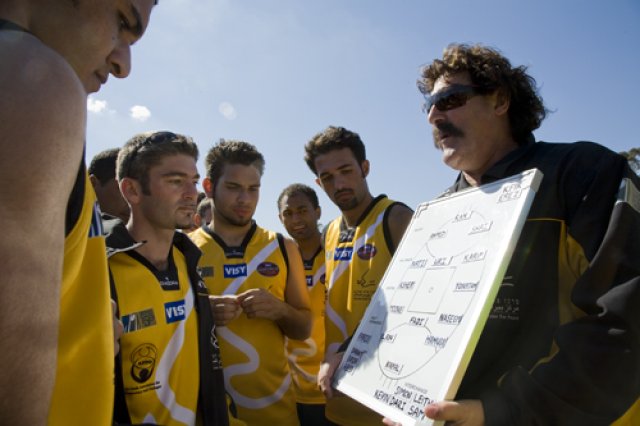
With much fanfare, the AFL Peace Team (an Australian rules football team made up of Palestinian and Israeli players) has once again come to Australia to compete in the AFL International Cup running from August 12 to 27.
Indeed, what can be more appealing for those of us who are passionate about peace in Israel-Palestine than to welcome this team of Palestinian and Israeli youth who have learned to play and interact not as enemies but as teammates?
The answer: the idea that when members of this team return to their homes, the Palestinian players would not have to go through dehumanising checkpoints, around high barbed wire walls and into Bantustans surrounded and suffocated by a matrix of Jewish-only roads, settlements and security zones.
The AFL Peace Team was created in 2008 to compete in the AFL International Cup. It is made up of an equal number of Israeli and Palestinian players supported by the Israeli Peres Center ― an Israeli organisation that aims to promote “peace and reconciliation”.
However, the team has come under heavy criticism from Palestinian and other human rights groups who insist that reconciliation is the process of bringing two people together and establishing friendly ties between them after an argument or a disagreement has ended.
Reconciliation is the healing phase and, as such, cannot be implemented while the environment that breeds the mistrust and the conflict still exists.

So far this year, Israel has announced the building of thousands more new Jewish-only homes on stolen Palestinian land in the West Bank.
United Nations agencies and human rights groups report that Palestinian homes have been demolished by Israel at record rates this year.
Israel still maintains a crippling inhumane siege against Palestinians in Gaza. It continues to pursue a process of Judaisation in East Jerusalem that is rapidly driving Palestinian residents out of their homes to be replaced by Jewish settlers.
In such an environment, how can reconciliation even begin?
The Peres Center fails to understand that peace cannot be achieved by parading Palestinians in the Peace Team around the world in efforts to showcase Israel’s “fair play” in sports ― without once addressing the real challenges Palestinian athletes face as a result of Israel’s 43 years of occupation and the devastating impact Israel’s policies have had on Palestinian sports and sports infrastructure.
The Peres Center would have met its goals of laying the foundations of “peace and reconciliation” better had it issued a statement calling on its government Israel to lift its crippling blockade and siege of Palestinian sports’ events and athletes.
The Peace Team promotes the illusion that Palestinian athletes have equal opportunities to compete and to excel in their fields. But in reality, the effect of Israel’s policies tell a different story.
The Palestinian National Football (soccer) Team, founded in 1952 but recognised by FIFA only after the creation of the Palestinian Authorities in 1998, has faced insurmountable challenges imposed by Israel.
Israel aims to isolate Palestinians in all fields, sporting as well as academic, medical and cultural.
This year, Israeli policies of occupation have sabotaged the Palestinian team, putting them at a great disadvantage as key members of the team were prevented from travelling into the West Bank from Gaza.
This is not news for those who follow this conflict.
Many Palestinian athletes have in the past suffered Israel’s blanket boycott on Palestinian sports. Palestinian Olympic athletes and youth teams are often denied exit and re-entry when travelling from Gaza to the West Bank.
In the qualifying rounds for the 2006 World Cup, five key players were prevented exit from Gaza by the Israeli authorities. As a result, Palestine failed to qualify.
A year later, the Palestine national team was prevented by Israel from travelling to play a World Cup qualifier in Singapore and so was eliminated.
In May 2008, the same team was unable to attend the AFC Challenge Cup. This meant they could not qualify for the 2011 Asia Cup.
This system of Israeli permits restricts and confines Palestinians, denying them their right to travel. It reminds us of the “pass laws” of Apartheid South Africa, which were put in place to limit the movement of Black South Africans and keep them in their segregated communities.
Such blanket confinement of an entire population is a form of collective punishment and is in violation of Article 33 of the Geneva Conventions.
Unfortunately, Israel’s assault on Palestinian sports and athletes is not limited to its system of permits.
During Operation Cast Lead in 2008-09, Israel’s indiscriminate bombardment of Gaza destroyed huge areas of the city, flattening houses, schools, hospitals and mosques. It also destroyed the Rafah national stadium.
More than 1400 people in Gaza were killed, including footballers Ayman Alkurd, Shadi Sbakhe and Wajeh Moshate.
So while Israel’s Peres Center parades its token “Peace Team” of Palestinian and Israeli athletes in a clear effort to normalise the occupation, and reduce the criticism and pressure Israel faces from human rights groups and the international community over its oppression of Palestinians, let us take a moment to consider the harsh conditions that Palestinian athletes endure in their daily lives.
Of course, an Israeli Palestinian team is worth celebrating ― but only if it comes from an Israeli- Palestinian society that is free of discrimination, in which Palestinians and Israelis live as equals on and off the playing field.
[Samah Sabawi is an Australian Palestinian writer and political analyst. She is public advocate for Australian for Palestine.]